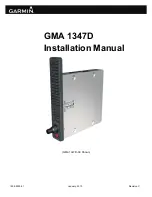
GTN 625/635/650 TSO Installation Manual
190-01004-02
Page 4-12
Rev. F
4.11 Antenna Installation and Connections
4.11.1 GPS Antenna
This section provides information on the antenna cable installation. Refer to Section 3.4 herein for
installation location considerations.
NOTE
The internal GTN unit COM does not interfere with its own GPS/SBAS receiver. However,
placement of the GTN unit antenna relative to other COM transceivers and antennas
(including the GTN unit COM antenna) is critical.
SUGGESTION:
Temporarily locate the GPS/SBAS antenna with coax connected to the GTN unit and check the GPS/
SBAS performance as described in Section 6.11.2
.
Once a suitable location has been verified, then
permanently mount the antenna.
Once the antenna mounting position has been prepared, route the coax cable from the antenna to the GTN
unit. Proper selection of coax cable and assembly of connectors is critical to GPS signal performance.
Cable loss from the GPS/SBAS antenna must be between 1.5 dB and 6.5 dB in order to maintain
proper rejection to interference signals.
Coaxial connectors and adapters, such as TNC to BNC, add additional loss to the cable and should be
considered when computing the cable loss. A typical loss of 0.2 dB can be used for each connection. To
maintain integrity of the SBAS signal, the GPS antenna coaxial cable must have a minimum of two shields
(e.g. RG-400 or RG-142B).
NOTE
If RG-142B or RG-400 is used, 1.5 dB equates to a length of approximately 6.5 feet of
cable with a connector on each end. RG-142B or RG-400 cable can be used as long as the
length is less than 35 feet. For longer lengths, use low-loss double or triple shielded 50
coax.
For very short runs, where the loss is less than 1.5 dB, additional cable should be used to increase the loss
to within 1.5 dB to 6.5 dB. This additional cable may be coiled, taking into account the minimum bend
radius of the cable.
During the post-installation checkout, susceptibility to harmonics of VHF COM transmitters will be
evaluated. If problems arise, then better isolation, or distance, may be required between the GPS and COM
antennas, or a 1575.42 MHz notch filter may be installed in series with the antenna coax of the VHF COM
transceiver to reduce or eliminate the harmonic interference. A notch filter for this use
(P/N 330-00067-00) is available from Garmin.
If a VHF COM transmitter causes problems with the GPS on the selected frequencies as listed in the post-
installation checkout, the problem may be due to the ELT. This can be verified by disconnecting the ELT
antenna coax at the ELT unit. If the ELT is found to cause the problem, then contact the ELT manufacturer
or replace the ELT.
Summary of Contents for GTN 625
Page 1: ...190 01004 02 February 2013 Revision F GTN 625 635 650 TSO Installation Manual ...
Page 2: ......
Page 242: ...GTN 625 635 650 TSO Installation Manual 190 01004 02 Page D 36 Rev F Figure D 24 Reserved ...
Page 250: ...GTN 625 635 650 TSO Installation Manual 190 01004 02 Page D 44 Rev F Figure D 32 Reserved ...
Page 253: ......
Page 254: ......



































